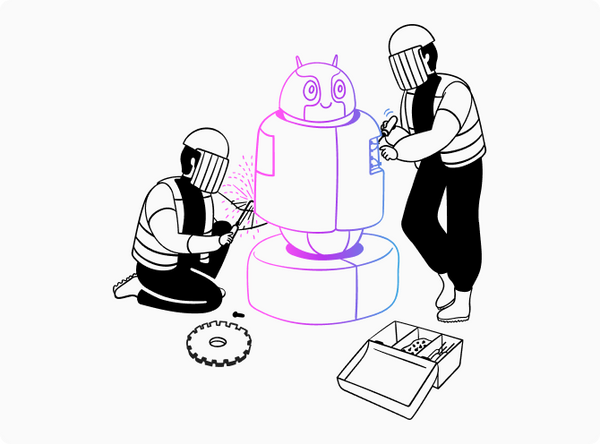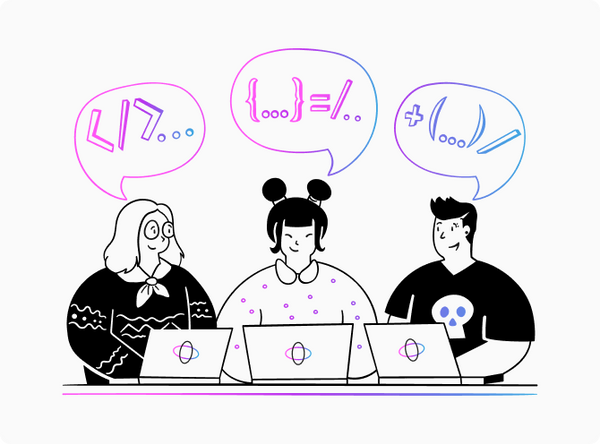
There's been a lot of buzz around the Django framework in recent years. If you take a look at some of the most popular websites and apps like Pinterest, Dropbox, Bitly, Reddit, and Quora — all these were developed using this framework. So what makes it so special then, and how to build MVP using Django? In today's post, we're going to answer this question.
Django for MVP : Everything You Need to Know About This Framework
Django is an open-source framework backed by Python and used for the creation of websites and web applications. What makes this framework popular — for MVP development in particular — is that it follows the Don't Repeat Yourself (DRY) rule, which helps to make the development process much more time efficient.
Basically, with Django, programmers can assemble the website like a Lego set, which is especially helpful for complex and high-load projects. As the Django development company, we at Lunka.tech have been using this framework for years. So, let's take a closer look at what else this framework can bring to your web project.
Benefits of Using Django for Developing MVP
Django framework comes with all the necessary tools and functionalities needed for secure and high-quality web development. If you're considering using this programming language for your project, here are some of its main benefits:
- Powered by Python — Python remains one of the most widely-used programming languages due to its simplicity and flexibility. So, for those working with Python, it will be quite easy to learn and utilize the Django framework.
- Highly secure — Django offers an impressive level of protection against all possible security vulnerabilities, such as SQL injections, forgery, cross-site scripting, and more.
- Rapid development — Django is an ideal solution for MVP development since it allows the creation of a fully functioning website or web application within a relatively short time frame. With Django, programmers can work on different components in parallel and integrate them more effectively.
- High scalability — the framework fits those projects that expect to deal with extreme loads because it's able to handle all the traffic-related requirements extremely well.
How to Develop an MVP With Django
Assess your business niche
Each and every project starts with a niche assessment and competitor analysis. Before proceeding to the MVP development using Django, first determine 1) the size of your market, 2) your target audience, and 3) your main competitors. When doing this, pay attention to the already existing products on the market — what features they offer, how they engage users, and what makes them relevant to the target audience.
By getting answers to those questions you'll be able to understand a) whether your MVP idea is viable or not, b) the level of potential demand for your future product, c) the main pain points of your target audience, and d) areas for potential growth that are currently overlooked by the competition.
Map out customer journey
Mapping out the user’s journey is important for understanding how users will interact with your product. Here, you basically need to outline all use case scenarios and put together your website or web app structure accordingly.
Think about what information users should be presented with on the first page/screen. Consider where they should be taken to from there. Flesh out what options they should have, and how in general your solution will help them solve their ‘problem’, step by step.
When working on the customer journey make sure you keep it clear and easy to comprehend. Avoid giving users too many options within your product as it can distract them from achieving their main goal and they may simply lose interest in your product.
Decide on the product features
One of the major mistakes that companies make when working on the first versions of their websites or apps is that they try to fit everything and anything into their product. The belief that the more advanced solution they create the more traction it will get on the market may be the hope. However, it's far from being true.
When it comes to MVPs, your task is to focus on implementing 2-3 main features that will be enough for the realization of your initial product idea. By doing so, you will be able to greatly 1) shorten the development timeline (when compared with a fully-fledged product) and 2) make sure that the early customers (or 'early adopters') won't get distracted by the secondary functionality that may corrupt the first impression of your product.
Decide on the development approach
There are a few different ways you can go with the development of MVP with Django framework. The first one is to do it all in-house with your own team. However, this approach comes with a number of issues to keep in mind.
In case you don't have an in-house team or your programmers lack expertise using Django for MVP development, you'll need to recruit an expert with the required skills. Aside from that, developing everything in-house may become quite an expensive endeavor as you'll also need to account for salaries, office rent, taxes, etc.
Another option is to find a reliable outsource partner who not only will be able to carry out all the development process for you, but also take the burden of the associated financial expenses off your shoulders.
Create an MVP
After you've decided how you want to proceed with your project — do it in-house or outsource it onshore/offshore — it's time to proceed to the technical side of the process, namely develop an MVP itself.
As mentioned previously, don't try to do everything at once, it's not the goal of your MVP. What you want to do is to come up with a basic version with features enough to test your business idea. In other words, you want to test the waters before making a huge investment in the development of a fully-fledged product.

Django for MVP Development: Main Challenges
Even though Django has all the tools and features needed to develop a website or web app, it too comes with some limitations. None of these have a direct impact on the product performance itself; however, it's better to be aware of the possible cons too before starting an MVP development with Django:
- May not fit small projects — Django is a high-end framework that calls for lots of code writing. So it may not be suitable for small projects where coding with such a framework may become confusing for the developers. The good news, however, is that it has great scalability possibilities and thus will work for MVPs just fine.
- Steep learning curve — even though the Django framework is clear, it may be difficult to learn if you don't have prior experience with Python. It has different syntax, so those developers who are switching to it from other languages may find it hard to learn.
- Monolithic structure — Django has a monolithic nature, thereby demands programmers follow a certain way of performing tasks. This means that developers can't come up with their own file structure but must follow the one specified by Django rules.

How Lunka.tech Can Help in Developing an MVP For Your Project
At Lunka.tech we have extensive expertise in MVP software development as well as taking projects from the prototype stage to a finished product. As can be seen from our portfolio, we work with various industries and markets and aren't afraid to step up to the challenge, no matter the complexity of it.
We always cater to the client's needs in terms of project budgets and timelines. We always strive to do our best to make sure our clients are 100% satisfied with the outcomes of our cooperation. If you want to use Django for MVP development and are looking for a team with relevant technical skills, look no further than Lunka.tech!

Final Thoughts
The Django framework is becoming more and more popular among startups and well established companies due to its robustness and flexibility. It is able to handle high-load projects and will fit well when you plan to scale your website or web application in the future.
We hope that by now you have a better understanding of how to develop an MVP with Django. In case you want to get more information or have some questions, don't hesitate to reach out to us via phone, email, or feedback form. Our team is always happy to help in any way possible!
FAQ
Can Django be used for developing an MVP?
Sure. Being a high-level Python network, Django allows for fast product development. It lets developers write maintainable and reusable code, which is especially important for MVPs. Django has also well-developed ML and AI ecosystems.
How can I make an MVP with Django?
First thing you want to do is to decide on the development approach — whether you will be building MVP with Django with the help of your in-house team or outsource your project. Once you have that out of the way, do the research to determine whether there is a market for your future product. If there is, decide on the primary features of your MVP, think over UI/UX, and carry out the technical side of the process.
Are there any examples of MVP built with Django?
Some of the most prominent examples of websites and applications built with Django are Instagram, Mozilla, Spotify, The Washington Post, Venmo, and Dropbox.
What are the limitations of Django?
Django comes with a monolithic structure that some consider as a positive feature but for other programmers it’s a disadvantage. Another Django drawback is that it has different syntax and comes with a large number of features that may be hard to master. But if you're looking for a team of Django experts, Lunka.tech is your go-to choice.


